Deception Valley (Happy Earth Day)
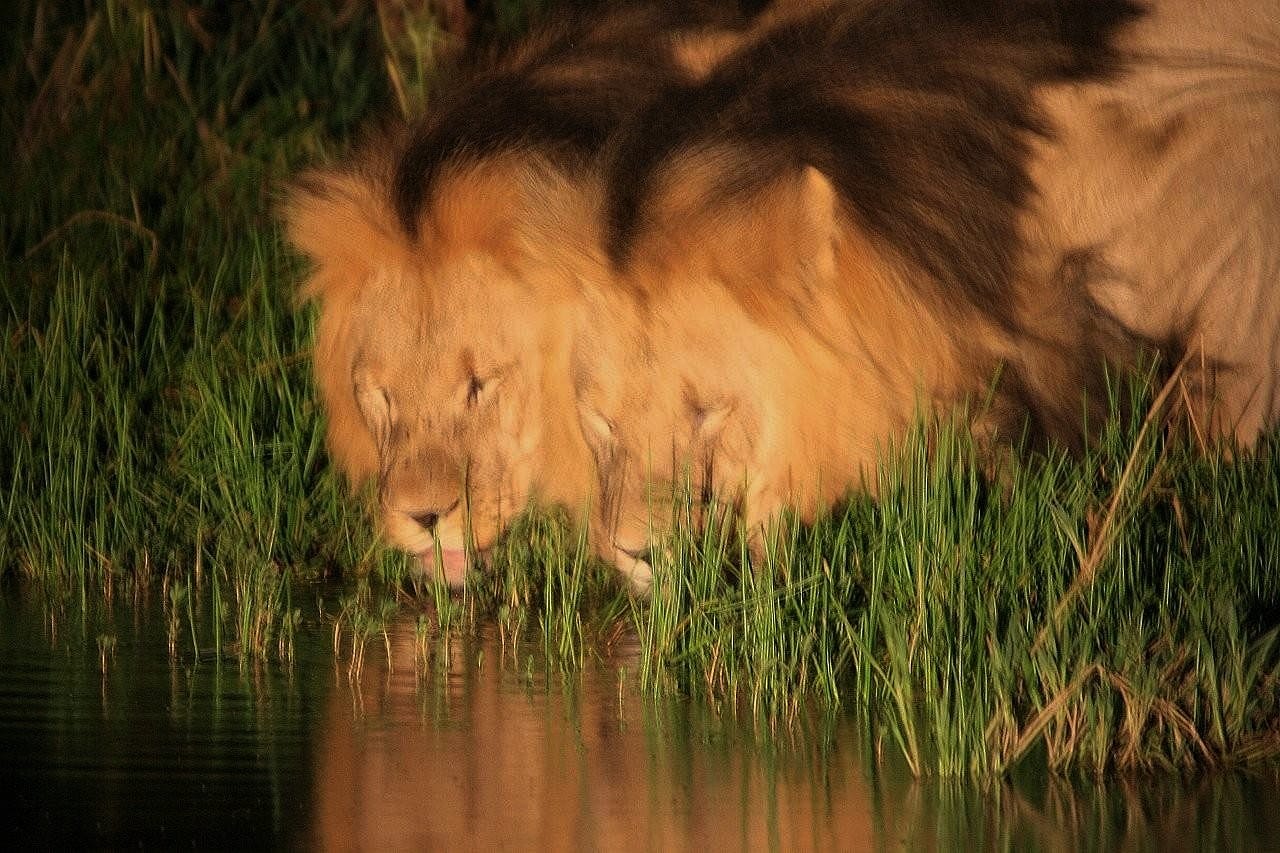
“Look deep into nature, and then you will understand everything better.”
— Albert Einstein
In the twilight, they press their cheeks together to drink. The vernal pool (though it is early autumn in the Kalahari) is still broad and full, plenty of room for the thirsty to spread out. But these brothers stand shoulder to shoulder, hip to hip, nearly as tall as me, their lush manes reflected in the water.
Tawny jaws open, tongues unfurl, and except for the buzzing of insects, the distant rumble of an approaching storm, there is only this: a rhythmic lapping, these two lions drinking in the dwindling light of dusk.
We watch and listen to the lions drinking for several minutes. My mind alternates between a Zen-like focus, absorbed in the moment, and a passage from Cry of the Kalahari. Authors Mark and Delia Owens were the first to study Kalahari lions and brown hyenas 30+ years ago, their former camp not far from where we’re parked. I recall a scene where, after a severe, multi-year drought, they watch a pair of two-year-old hyena cubs dip their tongues into the first water the cubs had ever tasted.
The name, Kalahari, derives from a similar Tswana word meaning roughly “the great thirst.” While not a true desert, even in a good year, less that 10 inches of rain typically fall in this part of the Kalahari. Thus much of a Kalahari lion’s water comes in the form of the animals it kills and consumes.
I am a pillar of water, but they’re not interested. Besides, if these fellows have a pride of females, the lionesses will land the prey for them.
When I glance over at my husband, I realize we’re both near tears. We have stepped out of one kind of life and into another.
We’ve stopped at the watering hole for ‘sundowners,’ civilized glasses of wine in silver goblets at day’s end. Yet, we’re in immense wilderness, with only our guide, Adriaan, and our native guide, Numsi, a San Bushman. We’re well away from our remote lodge, miles from other people, and four hours by unpaved roads from Maun, the nearest town of any size.
There are just the four of us in the sprawling Kalahari . . . and these two lions.
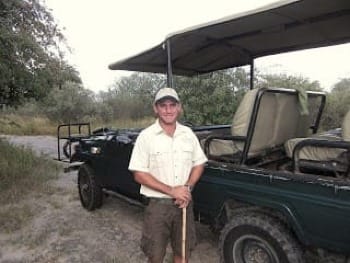
If you ask me what surprised me most during my time in Botswana, it is the bond between these big, lion brothers (Adriaan confirmed they are siblings), and how my time with them affected me.
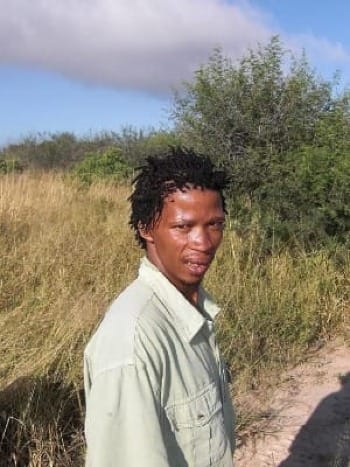
After drinking, they begin walking toward our Land Rover. The slightly smaller of the two turns toward the other lion who bears a darker, black-tinged mane. They pause, looking into each other’s face. Then the smaller, more golden-maned lion brushes up against his black-maned brother, first with his cheek, then the length of his body, the way a housecat rubs by the ankle of his human.
They amble on past us, one lion dropping into the grasses just a few yards from my side of the vehicle, and the other stretching out a bit farther away on the other side. Both of them lick their paws a few times and blink at us, ears twitching, as night and the first rain also drops around us. Then they close their eyes as if giving into a light nap.
To be in this moment with these lions is to sense what it is like to walk naked and unburdened, with neither worry nor shame, to be satisfied simply by drinking when you are thirsty and napping when you are sleepy and cleaning your feet when they get a little muddy, to stretch and know the potential of each muscle, to touch heads or brush cheeks and be recognized, acknowledged, wordlessly told Namaste, or something like, I see you, and the spirit in me honors the spirit in you.
Isn’t that what we all crave?
In what light remains, the lion to my left opens his eyes and looks directly at me. His eyes are a yellow amber, almost the color of his fur but intensely luminous. I gaze deep into those eyes until he closes them again.
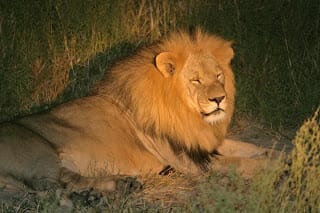
Why have I come looking for lions? I can rent a National Geographic or BBC program, see lions in high definition fill my husband's new big television screen, press my own cheek right up to those larger-than-life lion cheeks.
But it's all an illusion. A cool, flat screen is not a warm, massive muzzle that could turn on me. The vision is only 1s and 0s, a sublime mathematical constellation, the digital myth of lions stalking through my living room.
When I was 17, I discovered Plato’s allegory of the cave, a parable about people chained in a cave who never see the outside world, only the shadows of the outer world cast on a wall.
How easy it is for the shadow to seem like the only reality if one has never known the shadow’s maker. There is something more than the image of the Kalahari and my dream of a lion. I’ve come looking for that something more—I want to grasp it with my whole body as well as my mind.
By age 50, I’ve also discovered that you don’t ever visit a country, a town, a landscape, you visit whatever or whoever lives there, and you see what happens.
A place is an intersection in space and in time, where life shapes itself in wholly unique ways. Real is what happens in the relationships, the interrelationships. To be any place is always to be in relationship.
The lions’ presence alters me, the iconic faces turned individual. The scars and quirks in coloration tell me the black-maned creature before me is not a lion, but this lion, lion as person.
I see the sensual twisting and flicking of his tail, and the scruffy clot of fur at the tip. I hear the slow tongue abrasive against a paw’s pads, cleaning, comforting.
There’s surprise in the way his mane sounds like wind through dried reeds, a soft rustling, when he shakes his head. I smell the living body of this cat, a mix of melon rind, musk, dried mud, but no, different, beyond description.
When he rises to spray a camel thorn tree, the pungent drift of urine doused with rain, the wet acacia leaves, the freshly marked bark all combine in a single strange and oddly thrilling scent.
I want to believe my presence affects him, too.
Is he aroused by my scent, my pheromones, the slight surge of adrenaline, the light perspiration on my skin now cooling in night air, my breath, my body turning to silhouette against slivers of lightning, flashes of face, excited hands, hair blown wild?
The black-maned lion, the golden-maned lion, Numsi, Adriaan, my husband, me—we are a converging collection of hearts finding a common rhythm, here, now.
Lions paced the earth long before the modern human form left a single track in the mud. I didn’t know it when I planned our trip to Botswana and Deception Valley, but I left home to be with these lions in their straw-colored fleece, affirmed by their fiery eyes rimmed in darkness. Theirs are ancient eyes that have passed from lion to lion over millennia, now to these lions, finally falling on, into, my blue eyes.
I’m changed. Still, I’ll never know what that one lion, who looked at me in the Kalahari dusk, made out of my eyes, my presence.
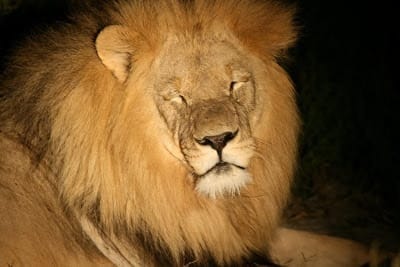
When I open the digital photos (yes, more 1s and 0s) that my husband and I took of those lion brothers, a few are frames filled entirely with lion face, also, peace.
The eyes are closed, the mouth—given the natural design of a lion’s facial bones and draping of skin—seems held in a subtle, content smile. Am I viewing with anthropomorphic eyes? I don’t think so. Anyway, they are my lions now that I’m back in my redwood cave, and I'm grateful to them.
Thank you to Adriaan & Wanda, Numsi, and the staff and owners of Deception Valley Lodge who created a true oasis of friendship, meaningful experiences, and wonderful lodging & shared meals in a challenging yet incredibly rich & beautiful landscape. Photos by my husband, Terry Schulz.
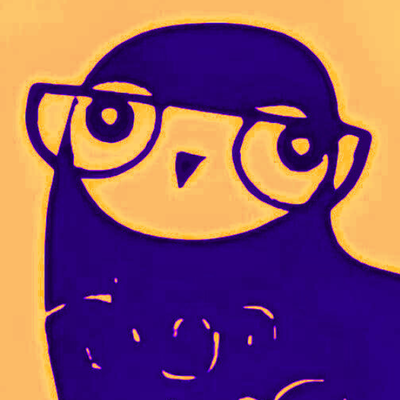
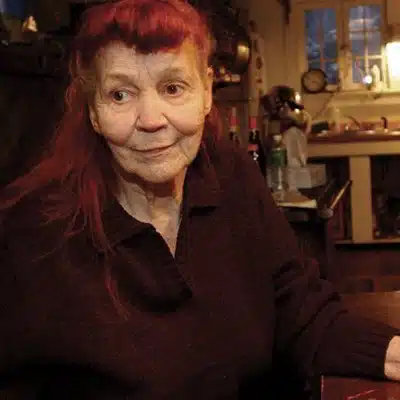
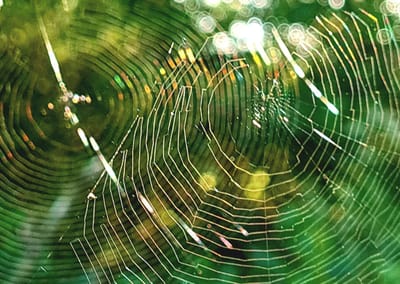
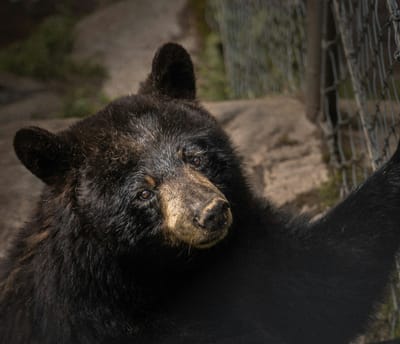
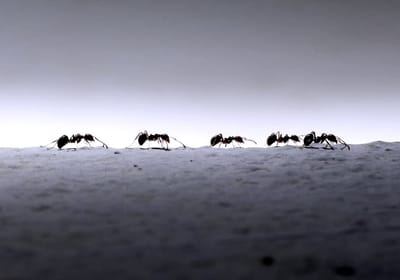
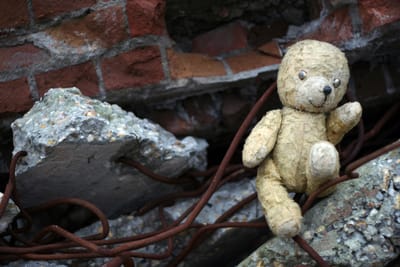
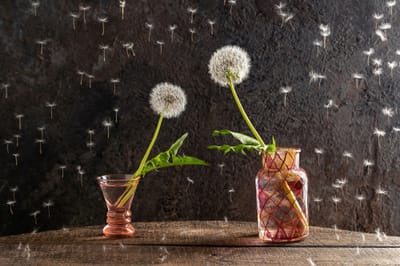
Member discussion